The government’s proposal for a significant food safety legislative overhaul sailed through the House of Commons agriculture committee Nov. 6 with almost no debate as Conservative MPs rejected all proposed amendments.
Bill S-11, the Safe Food for Canadians Act, now heads to the Commons for final debate and approval, possibly next week.
The bill would give the Canadian Food Inspection Agency increased powers to inspect imported food and to demand food inspection data from food companies.
Opposition MPs used the recent E. coli meat contamination of products from the XL Foods plant in Brooks, Alta., as an example of the need for change.
Read Also

Alberta harvest wrapping up: report
Harvest operations advanced to 96 per cent complete in Alberta as of Oct. 7, with only a few late-seeded cereal and canola fields remaining, according to the latest provincial crop report.
Government MPs on the agriculture committee insisted the bill as written is robust enough.
“We had amendments that would have improved the bill, but this government will not accept suggestions,” NDP agriculture critic Malcolm Allen said Nov. 7.
After an appearance by agriculture minister Gerry Ritz and then two sessions with witnesses — most of them supportive but suggesting amendments to the bill to correct what they saw as minor flaws — the committee met to conduct clause-by-clause consideration of the bill Nov. 6.
Opposition MPs promised to support the bill but offered several dozen “friendly” amendments that they said would make S-11 more clear.
The Conservative majority on the committee rejected all the amendments as unnecessary.
Debate was short as opposition MPs limited their speeches and the 48-page bill was approved in less than two hours.
A key opposition proposal was that an audit of Canadian Food Inspection Agency resources be conducted to determine a “baseline” for future audits of CFIA resources compared to the need. The bill requires a five-year audit of resources.
The Conservative majority on the committee rejected the proposed amendments, arguing that an audit of current CFIA resources as a “baseline” would be irrelevant to an audit five years down the road as required by the bill.
“Everything will have changed in five years so there is no point to compare it to what exists now,” Ontario Conservative MP Pierre Lemieux, parliamentary secretary to agriculture minister Gerry Ritz, said in a Nov. 6 interview.
NDP MP Alex Atamanenko, former agriculture critic, said after the Nov. 6 meeting that he was disgusted by the government decision to reject all amendments when they were meant to strengthen the bill and not dilute it.
“Opposition MPs made clear they supported the bill but hoped to improve it,” he said in an interview after the committee meeting.
“Instead, they took every proposal for change as a challenge to their bill. I find it reprehensible and you can quote me on that.”
















